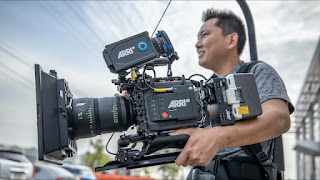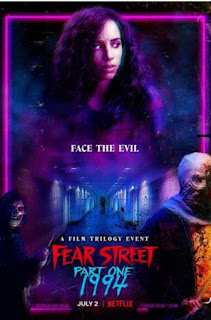Short Film Research: Thriller- Gridlock- Locked In For The Ride
Hey again! Today we have decided to inspect other short films that match our genre. First on our list was Gridlock by Ian Hunt Duffy. The short film was made available to us because it was uploaded onto the "Short of the Week" website, which is easily accessible on all platforms. To obtain the best viewing experience, my teammate and I watched them on a large laptop in a quiet room where we would be free of external distractions. We then conducted a thorough analysis of the conventions used by the short film, and we have outlined them below.
Camera Angles, Movement, and Shots:
In the short film, there are a wide variety of camera techniques applied. In terms of camera angles, the film primarily relied on eye-level shots, particularly when subjects wre conversing. The reason being is that doing so allowed for the audience to feel grounded in said conversations and not be tempted to dsitract themselves with what might be happening in the background. High angle shots were incorporated as well, although, they were used to the effect of eliciting a sense of sympathy in the audience when they realize how dismal the situation a particular subject finds themselves in truly is, such as when one of the female subjects is pictured mangled in the trunk of a vehicle.
Moving on to the shots used within the film. Wide shots were used to allow for multiple subjects to appear simultaneously on screen, specifically when a group of individuals gathered to search for the primary subject’s missing daughter. Likewise, two- and three-shots were also included for similar purposes. Over-the-shoulder shots were used to provide a less graphic idea of what was going on, a key feature of thrillers that differentiates them from the horror genre. A few close-up shots were sprinkled into the film, but the most impactful one occurred when the primary subject discovered his daughter’s doll in the woods, that shot serving as a pivotal moment with regards to the direction that the film was going to take.
When it comes to camera movement, tracking shots were used for animate and inanimate subjects, including the primary subject running around looking for his daughter, and even the primary subject’s vehicle being followed as it drove down the road. In the opening scene, a tilt was applied to shift the viewers' focus from that of the ground to the scenery ahead, marking the start of the film.
Mis-Én-Scene:
Costuming in this film was relatively simple and casual. The primary subject was dressed in a rather rugged manner, wearing a flannel shirt and jeans. This whilst the attire of the rest of the characters varied depending on their social status, ranging from more professional and expensive-looking clothing to regular, everyday streetwear.
The entire film was staged in broad daylight, so the lighting was very bright. At no point in the film did the lighting shift given that the plot did not advance to any locations or times where it would be necessary to do so.
In this short, acting was able to encompass a wide variety of raw emotion. There were feelings of distress, confusion, physical pain, anger, suspicion, relief, and shock that managed to portray themselves on screen within the limited time that the film provided. This was achieved through physical mannerisms, facial expressions, and varying tones of speech that truly sold the story being told.
The make-up of the subjects featured was primarily comprised of special effects to indicate that certain figures were injured, including the horse shown at the start of the film as well as the woman later discovered in the primary subject’s trunk. Most subjects, however, lacked makeup entirely, opting for a more natural look.
The main prop in this short film was the doll, given that it is what caused the primary subject to spiral and grow disheveled and violent in the first place.
As for the set, the film was primarily shot in an outdoor location in a vast, green forest. There were also some scenes shot on a small road in between the trees, as well as in the primary subject’s car at the very start of the film.
Sound:
This short film was riddled with non-diegetic sound in the form of music to really set the tone and ensure it conveyed the full way through. Said sounds manifested themselves through suspenseful music. This whilst aside from ambient noise within the forest, such as the sound of birds chirping for instance, or the sound of people talking on the phone, the only other diegetic sounds resulted from dialogue due to inter-subject interactions.
Editing:
Since the short film was primarily shot in a single location, it allowed for there to more uninterrupted and continuous shots. As a result, the only two main transitions used between scenes, aside from traditional cuts, were shot-reverse-shots during the conversation between the primary subject as he was driving and his daughter in the back seat, as well as those between other characters in the short.
Takeaways:
In this short film, we found there to be a limited number of different filming techniques applied. While were originally going to chalk it up to being because of the shortened length of the film, we realized that all the included shots and scenes are intentional. As a result, we have determined that said filmmaking decisions were made in accordance with the directorial style of the film’s creator. Overall, we particularly enjoyed the concept of filming a suspenseful thriller in the daytime, as well as the idea of choosing and sticking to a particular tone and theme throughout the entirety of a film, something we wish to emulate going forwards in our own work.
Since my team and I enjoyed the short film overall, in terms of creative choices, a compelling plotline, and a digestible message, we feel the need to express just how much we “like it like that(!)” (Cardi B 2018).


Comments
Post a Comment